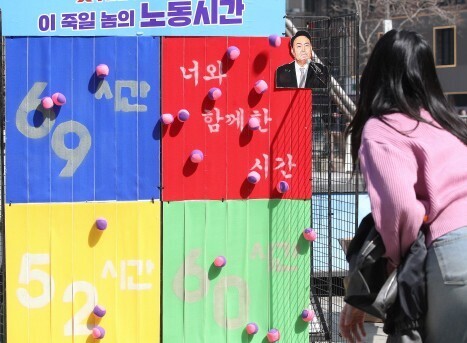hankyoreh
Links to other country sites 다른 나라 사이트 링크
Young Koreans vent rage over working hours already all too grueling

On Thursday, the Youth Community Union released responses it received on social media after asking for opinions on the government’s working time policy reform ahead of a meeting with Lee Jung-sik, the Minister of Employment and Labor.
Over the course of five days (March 18-22), 222 young Koreans shared their experiences with overtime work and their thoughts on the working time policy reform. With South Korea’s long working hours described as “common,” “the norm,” and “habitual,” the comments, which contained a lot of anger and hurt, reflected the impact of those hours on their physical well-being and on their lives.
“My coworker, who is not in good health, is worried sick. Another friend who has a weak constitution feels that they are being abandoned by the world,” shared a 38-year-old office worker at a company with less than 30 employees.
“If companies are allowed to work longer hours beyond the current 52-hour law, which is not being adhered to, the government is basically allowing companies to commit whatever atrocities they want,” commented a 30-year-old worker in the media and culture field in a company with less than 30 employees.
Kim Seol, chair of the Youth Community Union, stated, “When we asked for people to send in their opinions, we received many comments from youth working in small businesses and who are in precarious working situations.”
Young people argued that maintaining physical health is difficult even with the current 40-hour workweek that has a 12-hour overtime limit. A 31-year-old clerical temp worker in Daegu stated that “working 51-52 hours feels like you are completely trussed to the company,” and that “after working such long hours, you lack the enthusiasm to do anything.”
A 33-year-old job seeker in Gwangju spoke of working 10 hours a day, six days a week. “It took me a year after I quit to recover,” they shared.
Seeing how the government’s proposal to reform working hours has been fluctuating from a maximum of 69 hours to 64 hours to 60 hours, some young people expressed criticism. “Policies can’t be compared to skipping stones,” one 31-year-old job seeker said. “You can’t just throw the policy and decide whether it works by seeing if it floats or if it sinks.”
Many expressed fear about the number of working hours, which the government appears to be pulling from thin air and constantly changing, with one 23-year-old baker sharing that “when it comes to labor, time can never be reduced to a simple number.”
Others emphasized that the government’s working time policy reform should fulfill its original intention of setting a minimum standard to protect vulnerable workers. A 29-year-old office worker at a business with less than 30 employees appealed to the government, saying that it should “design a system based on workers who need to be protected.”
A 37-year-old worker who works irregular shifts asked, “If I take a break after working long hours, will all the damage I received disappear? Why are we inflicting this sort of damage on people in the first place?”
Most of the people who wrote to the Youth Community Union were job seekers who work or have worked for small companies. Of the 222 respondents, 138 worked for companies with fewer than 100 employees, and 42 were job seekers and freelancers.
While the government has been emphasizing that it’s listening to the opinions of younger generations and holding daily meetings with white-collar youth in large companies, these voices have not yet reached the government. Their opinions will be delivered to Minister Lee Jung-sik on Friday.
By Bang Jun-ho, staff reporter
Please direct questions or comments to [english@hani.co.kr]

Editorial・opinion
![[Column] Life on our Trisolaris [Column] Life on our Trisolaris](https://flexible.img.hani.co.kr/flexible/normal/500/300/imgdb/original/2024/0505/4817148682278544.jpg) [Column] Life on our Trisolaris
[Column] Life on our Trisolaris![[Editorial] Penalties for airing allegations against Korea’s first lady endanger free press [Editorial] Penalties for airing allegations against Korea’s first lady endanger free press](https://flexible.img.hani.co.kr/flexible/normal/500/300/imgdb/original/2024/0502/1817146398095106.jpg) [Editorial] Penalties for airing allegations against Korea’s first lady endanger free press
[Editorial] Penalties for airing allegations against Korea’s first lady endanger free press- [Editorial] Yoon must halt procurement of SM-3 interceptor missiles
- [Guest essay] Maybe Korea’s rapid population decline is an opportunity, not a crisis
- [Column] Can Yoon steer diplomacy with Russia, China back on track?
- [Column] Season 2 of special prosecutor probe may be coming to Korea soon
- [Column] Park Geun-hye déjà vu in Yoon Suk-yeol
- [Editorial] New weight of N. Korea’s nuclear threats makes dialogue all the more urgent
- [Guest essay] The real reason Korea’s new right wants to dub Rhee a founding father
- [Column] ‘Choson’: Is it time we start referring to N. Korea in its own terms?
Most viewed articles
- 1New sex-ed guidelines forbid teaching about homosexuality
- 260% of young Koreans see no need to have kids after marriage
- 3[Column] Life on our Trisolaris
- 4OECD upgrades Korea’s growth forecast from 2.2% to 2.6%
- 5Presidential office warns of veto in response to opposition passing special counsel probe act
- 6Months and months of overdue wages are pushing migrant workers in Korea into debt
- 7[Guest essay] Maybe Korea’s rapid population decline is an opportunity, not a crisis
- 8[Editorial] Penalties for airing allegations against Korea’s first lady endanger free press
- 9[Reportage] On US campuses, student risk arrest as they call for divestment from Israel
- 10Korea sees more deaths than births for 52nd consecutive month in February